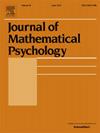对评估模型的统一观点,第二部分:二分类潜在变量
IF 1.5
4区 心理学
Q2 MATHEMATICS, INTERDISCIPLINARY APPLICATIONS
引用次数: 0
摘要
在过去的几年里,心理测量学和数学心理学领域发展了一些评估理论。其中以项目反应理论(IRT)、认知诊断评估理论(CDA)和知识结构理论(KST)最为显著。尽管它们有共同的目标,但这些理论在很大程度上是独立发展的,关注的方面略有不同。在这个由三部分组成的工作的第一部分中,介绍了一个总体框架,目的是实现统一的视角。该框架由两个原语(结构和过程)和两个操作(分解和再参数化)组成,它们允许导出这些理论的模型并在一般分类法中将它们系统化。在第二份贡献中,第一部分中介绍的框架被用于推导基于二分类潜在变量的KST和CDA模型,从而获得了双重结果:一方面,它解决了框架之间的关系;另一方面,它提供了两个框架的同时泛化,从而为分析更一般的模型和情况提供了基础。本文章由计算机程序翻译,如有差异,请以英文原文为准。
Toward a unified perspective on assessment models, part II: Dichotomous latent variables
In the past years, several theories for assessment have been developed within the fields of Psychometrics and Mathematical Psychology. The most notable are Item Response Theory (IRT), Cognitive Diagnostic Assessment (CDA), and Knowledge Structure Theory (KST). In spite of their common goals, these theories have been developed largely independently, focusing on slightly different aspects. In Part I of this three-part work, a general framework was introduced with the aim of achieving a unified perspective. The framework consists of two primitives (structure and process) and two operations (factorization and reparametrization) that allow to derive the models of these theories and systematize them within a general taxonomy. In this second contribution, the framework introduced in Part I is used to derive both KST and CDA models based on dichotomous latent variables, thus achieving a two-fold result: On the one hand, it settles the relation between the frameworks; On the other hand, it provides a simultaneous generalization of both frameworks, thus providing the foundations for the analysis of more general models and situations.
求助全文
通过发布文献求助,成功后即可免费获取论文全文。
去求助
来源期刊

Journal of Mathematical Psychology
医学-数学跨学科应用
CiteScore
3.70
自引率
11.10%
发文量
37
审稿时长
20.2 weeks
期刊介绍:
The Journal of Mathematical Psychology includes articles, monographs and reviews, notes and commentaries, and book reviews in all areas of mathematical psychology. Empirical and theoretical contributions are equally welcome.
Areas of special interest include, but are not limited to, fundamental measurement and psychological process models, such as those based upon neural network or information processing concepts. A partial listing of substantive areas covered include sensation and perception, psychophysics, learning and memory, problem solving, judgment and decision-making, and motivation.
The Journal of Mathematical Psychology is affiliated with the Society for Mathematical Psychology.
Research Areas include:
• Models for sensation and perception, learning, memory and thinking
• Fundamental measurement and scaling
• Decision making
• Neural modeling and networks
• Psychophysics and signal detection
• Neuropsychological theories
• Psycholinguistics
• Motivational dynamics
• Animal behavior
• Psychometric theory
 求助内容:
求助内容: 应助结果提醒方式:
应助结果提醒方式:


